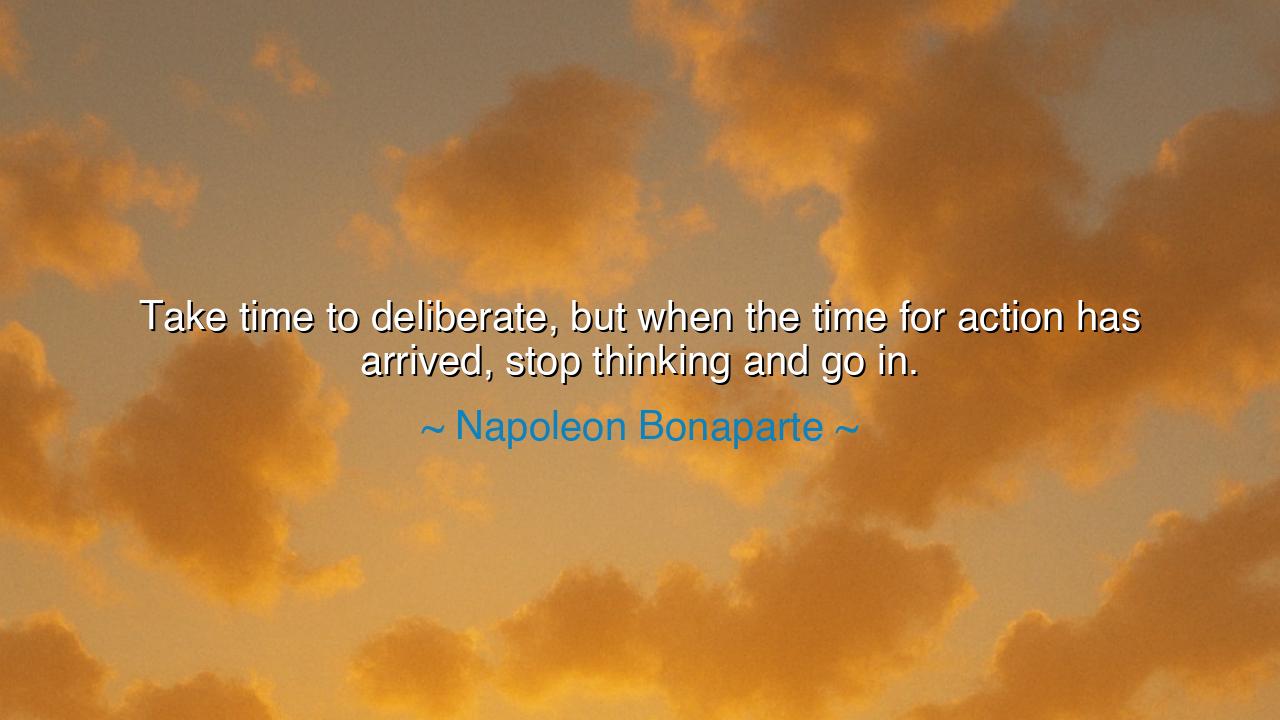
Take time to deliberate, but when the time for action has
Take time to deliberate, but when the time for action has arrived, stop thinking and go in.






The words of Napoleon Bonaparte, conqueror of Europe and master of strategy, cut through the fog of hesitation like the sound of a trumpet at dawn: “Take time to deliberate, but when the time for action has arrived, stop thinking and go in.” In this wisdom lies the balance between caution and courage, between the mind that plans and the heart that dares. For thought is essential in preparing the path, but when the hour of decision strikes, thought must yield to action, swift and uncompromising.
The meaning is clear: one who lingers too long in deliberation will lose the moment, for opportunity is like a door that opens only briefly. To prepare is wise, but to hesitate endlessly is ruin. The battlefield of life does not wait for the slow; it crowns the one who seizes the instant. Napoleon’s words teach us that greatness comes from a union of careful planning and decisive movement—without one, there is chaos; without the other, there is stagnation.
Napoleon himself was famed for this ability. Before battles, he studied maps, terrain, and intelligence with patience, weighing his moves like a master of chess. Yet when the hour struck, he commanded his troops with boldness that left his enemies reeling. At Austerlitz, known as the “Battle of the Three Emperors,” he lured his foes with cunning preparation, then struck decisively, shattering armies larger than his own. His success was not in mere planning, nor in mere daring, but in the perfect marriage of the two.
History shows others who embodied this teaching. Consider George Washington crossing the icy Delaware on Christmas night in 1776. He had weighed his chances carefully, knowing the risks of such a bold strike. But when the time came, he did not waver in endless thought—he acted. The attack at Trenton revitalized the Revolution. Had Washington delayed a moment longer, the chance would have been lost, and perhaps with it, the dream of a nation. Action, once chosen, must be pursued with full force.
This wisdom applies not only to war, but to all realms of human life. In love, in work, in invention, hesitation is often the enemy. A man may weigh for years whether to confess his heart, and in that delay, lose the one he loves. An inventor may plan endlessly, yet if he never acts, his vision dies in the cradle of thought. The teaching of Napoleon is that when the moment arrives, thought must give way to courage, or the gift of opportunity vanishes into nothingness.
The deeper truth is that both extremes are dangerous. The fool who acts without thought invites ruin; the coward who thinks without acting ensures failure. But the wise man, like a skilled archer, takes careful aim, then releases the arrow with no hesitation. Balance is the law—deliberation before, decisiveness after. This is the way of those who shape destiny.
The lesson for you, seeker, is this: prepare thoroughly, but do not linger. When your heart tells you the hour has come, step boldly. Do not let fear of failure bind your feet, for even failure in action brings more growth than safety in endless hesitation. Life does not reward the one who waits forever—it honors the one who dares when the hour demands.
Practical actions follow: before decisions, study, reflect, and plan as best you can. But once the time is chosen, silence the doubts and act with full force. Train yourself to recognize the moment of decision and to seize it without delay. In this way, your life will move with both wisdom and boldness, and you will not be left among those who thought long, but did nothing.
So remember, children of tomorrow: deliberate while you may, but when the hour strikes, act with the courage of a lion. For hesitation at the moment of destiny is the grave of greatness, but decisive action is the chariot that carries men to victory and immortality.






AAdministratorAdministrator
Welcome, honored guests. Please leave a comment, we will respond soon